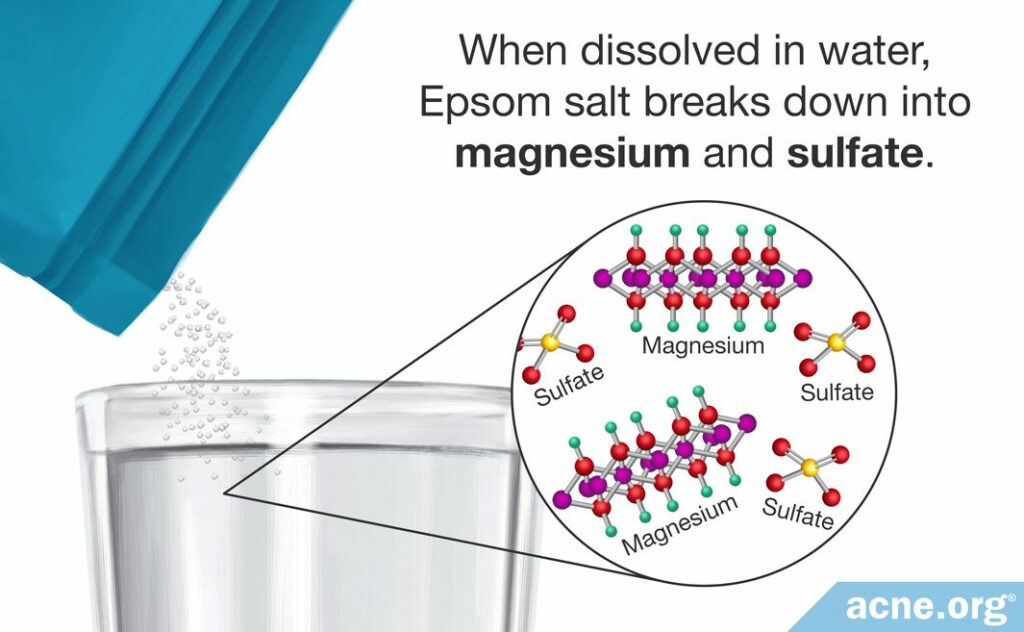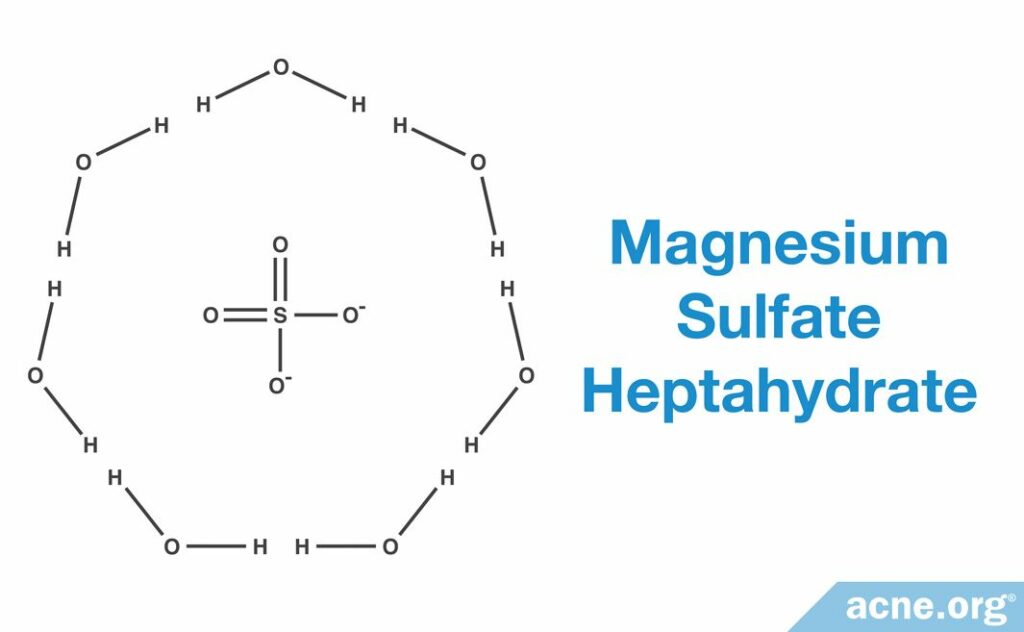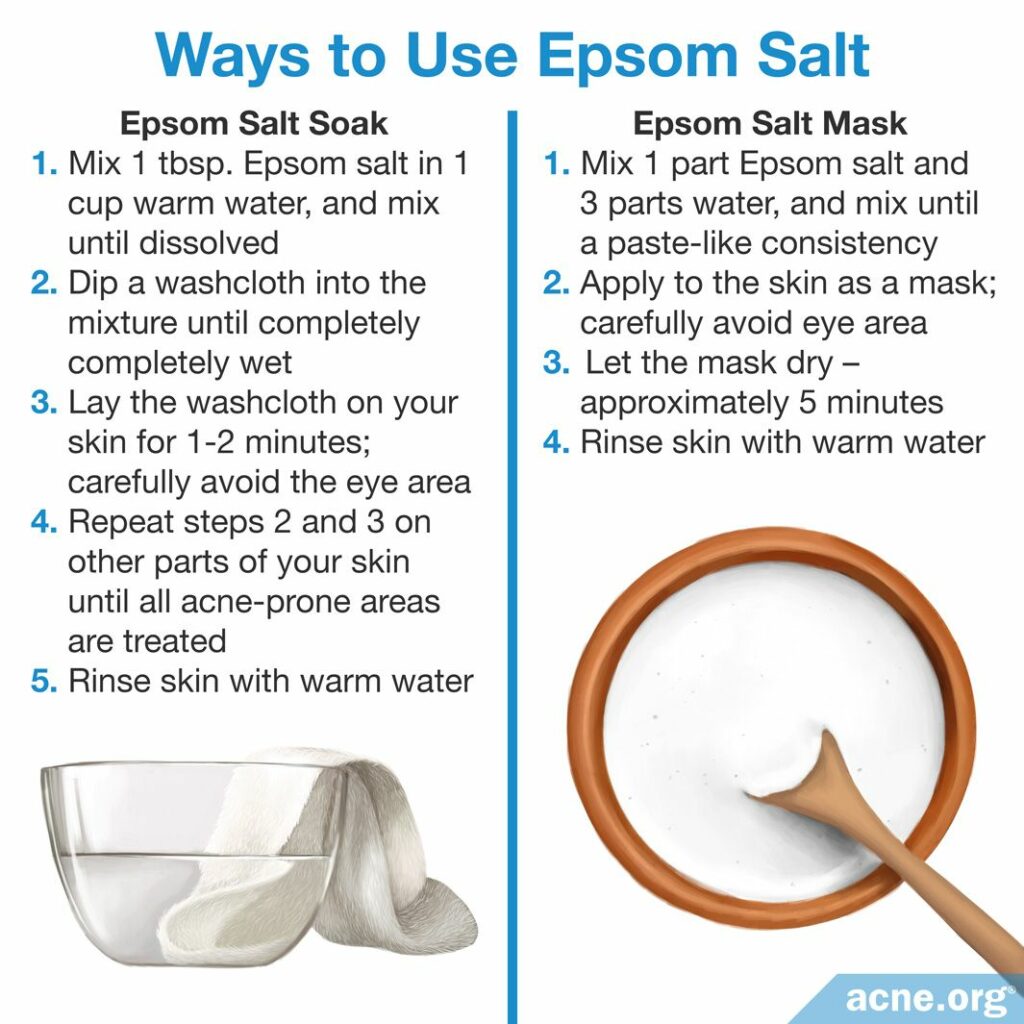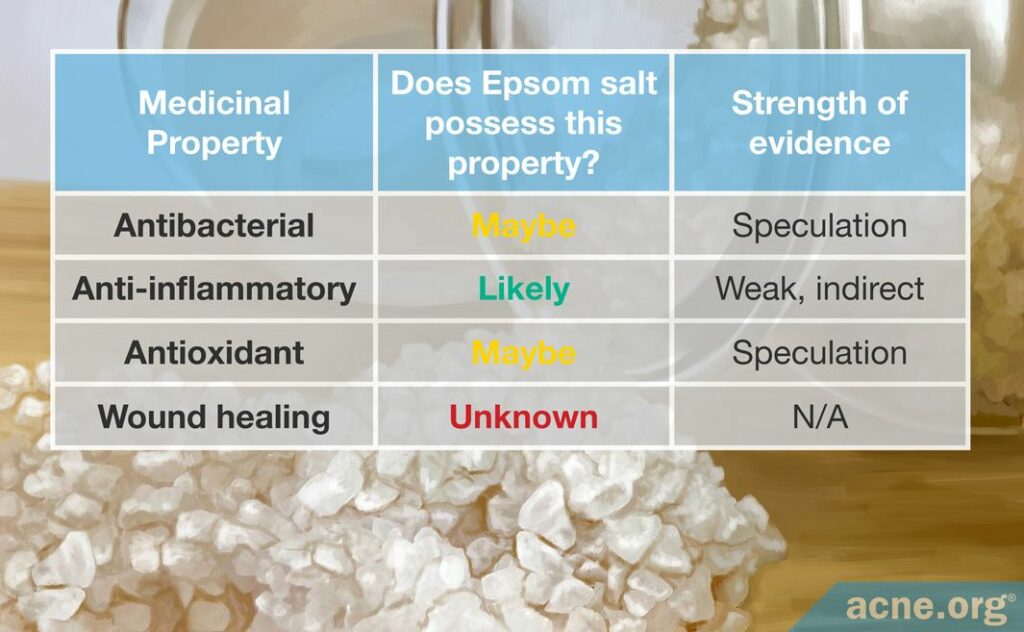Some Weak, Indirect Evidence Suggests That It Might Help a Bit

The Essential Info
Epsom salt (magnesium sulfate) is a popular folk remedy that some people apply to the skin in an attempt to treat acne.
While doctors recognize Epsom salt as an effective oral medication for conditions like constipation and asthma, no studies have looked at whether topical Epsom salt helps with acne.
However, weak, mostly indirect evidence suggests that Epsom salt might possess the following properties that could hypothetically help reduce acne when applied topically:
- Antibacterial
- Anti-inflammatory
- Antioxidant properties
In other words, we don’t know if it will help, but it just might.
Since Epsom salt causes no known side effects and is readily available, if you want to try an Epsom salt soak or mask at home, it should be safe to try. Just be careful to avoid your eye area and keep your expectations realistic.

The Science
- What Is Epsom Salt?
- Topical Uses of Epsom Salt
- Epsom Salt Possesses Medicinal Properties That Might Help with Acne
- Antibacterial Properties of Epsom Salt
- Anti-inflammatory Properties
- Antioxidant Properties
- Wound-healing Properties
- Other Properties of Epsom Salt That Might Help with Acne
- Side Effects of Epsom Salt
- The Bottom Line
Epsom salt is a popular home remedy for acne. No studies so far have tested its effectiveness on people with acne, but since it may have antibacterial, anti-inflammatory, and antioxidant properties, it might help.
What Is Epsom Salt?
Epsom salt is a naturally occurring mineral that looks like large grains of sea salt. Chemically speaking, it is magnesium sulfate (MgSO4). When dissolved in water, Epsom salt breaks down into two components, magnesium and sulfate.1,2

The chemistry of Epsom salt
Magnesium sulfate typically forms a complex with seven molecules of water, becoming magnesium sulfate heptahydrate. This is the form Epsom salt normally exists in.

However, other forms of magnesium sulfate, complexed with one water molecule or with none at all, are also possible versions of Epsom salt.
Epsom salt dissolves well in water and not so well in oil-based substances. In water, Epsom salt separates into its two components, magnesium and sulfate. These smaller molecules are able to pass through the skin more easily. This means that skincare products containing Epsom salt should ideally be formulated with water.2,3
Epsom salt has a pH (acidity) of 6.0, close to the optimal skin pH of 5.5. This means that Epsom salt will not disrupt the acidity of the skin, which is important for skin health.
Epsom salt is an approved oral medication for constipation and several other conditions that you can learn about in the drawer below, but our interest is using it topically.
Oral uses of Epsom salt
Epsom salt is most often taken orally as a laxative to relieve occasional constipation. It is also an approved oral medication for treating asthma, seizures in pregnant women suffering from eclampsia (dangerously high blood pressure), and certain heart conditions.2
Because the human body needs magnesium to function properly, the U.S. Food and Drug Administration (FDA) has also approved Epsom salt as an additive to food products. In the body, magnesium helps to:
- Regulate blood sugar
- Stabilize blood pressure
- Control muscle function
- Improve nerve conduction2
Topical Uses of Epsom Salt
Even though topical Epsom salt is not officially approved to treat any condition, people have long used it to relieve skin irritation, sore feet and muscles, and stiff joints. Manufacturers often include Epsom salt in skin and hair care products. For example, face masks may contain up to 25% Epsom salt.2
You can make your own Epsom salt soak or mask by mixing Epsom salt in water, as follows:

But will it work? There are no studies to tell us whether Epsom salt really works for acne, so let’s drill down and decide for ourselves whether it might work.
Theoretically, for topical Epsom salt to improve acne, it would have to:
- Penetrate into the skin to have an effect:
It does - Possess medicinal properties that can help with acne:
It may possess some
Expand to Read Details on Epsom Salt’s Ability to Penetrate the Skin
To measure the size of molecules, scientists use daltons (Da). Theoretically, any molecule smaller than 500 Da should be able to pass through the skin. A single molecule of magnesium sulfate, which makes up Epsom salt, measures about 120 Da. In other words, individual molecules of Epsom salt should be able to penetrate the skin. As we have learned, in water, Epsom salt will always separate into its two components, magnesium and sulfate, and these two components are even smaller. For instance, magnesium only measures about 24 Da.3 So no matter how you slice it, Epsom salt should be able to penetrate into the skin.
To date, one preliminary study has tested how well Epsom salt passes through the skin. In that study, researchers from the University of Birmingham soaked 19 volunteers in Epsom salt baths for 12 minutes a day over 7 days. The scientists measured the levels of magnesium and sulfate, the two main components of Epsom salt, in the volunteers’ blood before and after the course of treatment. They found that both levels rose after the baths, meaning that both components had successfully passed from the skin into the body. The researchers wrote, “(S)ulfate levels in [blood] rose in all subjects after bathing in Epsom salts.”4 As a result, the study authors recommended soaking two to three times a week in 500 to 600 grams of Epsom salts to raise the level of magnesium in the blood to the optimal level for health benefits.
Research suggests that magnesium passes into the skin largely through skin pores. Interestingly, magnesium seems to penetrate better into skin with a weakened skin barrier. Since acne-prone skin tends to have a weakened skin barrier, this suggests that acne-prone skin may absorb magnesium especially well, which is good news for a topical Epsom salt treatment.5
However, scientists do not know exactly how well sulfate from Epsom salt might pass through the skin.6
Epsom Salt Possesses Medicinal Properties That Might Help with Acne
Acne is a complex disease caused by many factors. To be effective against acne, Epsom salt would need to possess some or all of the following medicinal properties:
- Antibacterial properties: Killing the acne bacteria C. acnes, which play a role in making acne lesions worse, can improve acne.
No study has tested the ability of Epsom salt to kill acne bacteria. However, there is reason to think Epsom salt might have some antibacterial activity.7,8
- Anti-inflammatory activity: Reducing inflammation (redness, itching, swelling, and soreness) can help fight the root cause of acne.
Some scientific evidence suggests that Epsom salt may decrease inflammation.8,9
- Antioxidant activity: Antioxidants remove free radicals, naturally-occurring toxins that accumulate in the body and contribute to acne.
Scientists speculate that Epsom salt may have antioxidant properties.6 - Wound-healing properties: Wound healing is important for the skin’s recovery from acne lesions.
There is no evidence that Epsom salt possesses any wound healing properties.

In other words, there is reason to think that Epsom salt might fight some of the key players in acne.
Let’s take an even deeper dive now and have a closer look at the evidence for each medicinal property.
Antibacterial Properties of Epsom Salt
No studies have looked at whether Epsom salt can kill acne bacteria. However, research shows that when applied topically, Epsom tends to draw water out of the skin. Since bacteria like C. acnes need water to survive, some researchers speculate that Epsom salt could kill these bacteria by dehydration.8 It is important to keep in mind that this idea has yet to be tested experimentally.
Anti-inflammatory Properties of Epsom Salt
Epsom salt may inhibit inflammation by preventing the body from releasing proteins that trigger inflammation.8
We have one direct study, published in 2005 in the International Journal of Dermatology, that shows us that Epsom salt may directly reduce skin inflammation:

The study found that bathing in Dead Sea salt, which is different from Epsom salt but is also rich in magnesium, reduces skin inflammation. The study authors wrote, “Skin roughness and redness of the skin as a marker for inflammation were significantly reduced after bathing in the salt solution.“9
In other words, somewhat weak, indirect evidence suggests that Epsom salt may decrease inflammation in acne.
Antioxidant Properties of Epsom Salt
There is no direct evidence that Epsom salt possesses antioxidant properties. However, scientists speculate that magnesium, a major component of Epsom salt, may fight free radicals, although exactly how it may do so is unclear.6
Wound-healing Properties of Epsom Salt
There is no evidence that Epsom salt speeds up wound healing.
Other Properties of Epsom Salt That Might Help with Acne
Epsom salt is hygroscopic, which means it absorbs moisture from the air. If placed on the skin, it will also tend to draw out moisture from the skin. This might theoretically be a plus for people with pustular acne–the type of acne filled with pus, as topical Epsom salt may help to dry out the acne lesions.
Side Effects of Epsom Salt
Epsom salt causes no known side effects and are safe for the skin. We can see this stated clearly in a report published in the International Journal of Toxicology in 2018:

The Cosmetic Ingredient Review Expert Panel wrote, “[t]he extensive clinical experience of the Panel, including the results of numerous patch tests, indicates that magnesium salts do not have the potential to induce sensitization.”11
When it comes to the magnesium component of Epsom salt, the body only absorbs as much magnesium as it needs, and the kidneys remove any excess magnesium with the urine. In other words, it is next to impossible to experience a magnesium overdose.
The Bottom Line
Epsom salt is a popular topical home treatment for acne. While some weak evidence suggests that Epsom salt might help with acne, no studies have tested this treatment on patients. However, applying Epsom salt to the skin is safe and might be worth a try. Just don’t expect miracles.
References
- Kawamura, Y. Magnesium sulfate: Chemical and technical assessment. Methods 4, (2007). http://www.fao.org/fileadmin/templates/agns/pdf/jecfa/cta/68/Magnesium_Sulfate.pdf
- Cosmetic Ingredient Review Expert Panel. Safety Assessment of Pentaerythrityl Tetra-Di-t-Butyl Hydroxyhydrocinnamate as Used in Cosmetics Status : Final Report. (2014). https://www.cir-safety.org/sites/default/files/pentae032014final.pdf
- Dehaven, C. Delivery of cosmetic ingredients to the skin. (2014). https://www.isclinical.com/media/WhitePapers/pdf/WhitePaper_DeliveryOfCosmetics_July2014_1_.pdf
- Waring, D.H. Report on Absorption of magnesium sulfate (Epsom salts) across the skin. 25-27. http://www.epsomsaltcouncil.org/wp-content/uploads/2015/10/report_on_absorption_of_magnesium_sulfate.pdf
- Chandrasekaran, N. C., Sanchez, W. Y., Mohammed, Y. H., Grice, J. E., Roberts, M. S. & Barnard, R. T. Permeation of topically applied Magnesium ions through human skin is facilitated by hair follicles. Magnes. Res. 29, 35-42 (2016). https://www.ncbi.nlm.nih.gov/pubmed/27624531
- Chandrasekaran, N. C. et al. Effects of magnesium deficiency – More than skin deep. Exp. Biol. Med. 239, 1280 – 1291 (2014). https://www.ncbi.nlm.nih.gov/pubmed/24928863
- Oberemok, S. S. & Shalita, A. R. Acne vulgaris, I: pathogenesis and diagnosis. Cutis. 70, 101 – 105 (2002). https://www.ncbi.nlm.nih.gov/pubmed/12234155
- Llp, D. & Pollack, G. E. United States Patent (19) 11 Patent Number : 5,898,037. (1999).
- Proksch, E. et al. Bathing in a magnesium-rich Dead Sea salt solution improves skin barrier function, enhances skin hydration, and reduces inflammation in atopic dry skin. Int. J. Dermatol. 44, 151 – 157 (2005). https://www.ncbi.nlm.nih.gov/pubmed/15689218
- Jahnen-Dechent, W. & Ketteler, M. Magnesium basics. Clin. Kidney J. 5, i3 – i14 (2012). https://www.ncbi.nlm.nih.gov/pubmed/26069819
- Johnson, W. Jr., Bergfeld, W. F., Belsito, D. V., Hill, R. A., Klaassen, C. D., Liebler, D. C., Marks, J. G. Jr., Shank, R. C., Slaga, T. J., Snyder, P. W., Andersen, F. A. & Heldreth, B. Safety Assessment of Magnesium Sulfate as Used in Cosmetics. Int. J. Toxicol. 37(1_suppl), 47S-54S. (2018). https://www.ncbi.nlm.nih.gov/pubmed/29761729
The post Can Topical Epsom Salt Treat Acne? appeared first on Acne.org.
